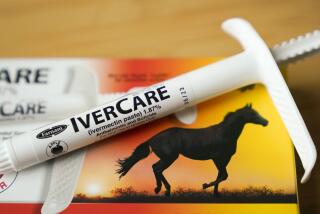FDA Denies Bid to Restrict Its Authority : Regulatory: A petition sought to stop approval of genetically engineered products. It was filed after the deaths of more than 24 people who took L-tryptophan.
- Share via
WASHINGTON — The Food and Drug Administration on Friday denied a petition that sought to stop it from approving genetically engineered products.
The agency said there is no evidence the products endanger the public.
The Foundation on Economic Trends filed the petition in August, 1990, after more than 1,500 people became ill and more than two dozen died after taking L-tryptophan, an amino acid used as a remedy for insomnia, appetite control and depression.
The foundation cited studies that linked the deaths to the genetic engineering process used by Showa Denko K.K. of Japan, the company to which the L-tryptophan deaths and illnesses had been traced.
The FDA said the petition was “groundless.”
“The petition, if adopted, would have suspended all FDA action, including approval, on some three dozen drugs and biologics undergoing review for marketing approval and more than 900 clinical trials that are under way with FDA’s approval,” the agency said.
These products include vaccines, diagnostic tests for blood tests and therapeutics for arthritis, cancer, AIDS and heart disease, the FDA said.
Andrew Kimbrell, a foundation attorney, blasted the decision not to suspend approvals of genetically engineered products.
“L-tryptophan could be the Chernobyl of genetic engineering,” he said.
The FDA ordered L-tryptophan off the market in March, 1990, after it was implicated in deaths and illnesses caused by an unusual blood disorder called eosinophilia-myalgia syndrome.
“If it is true that L-tryptophan was made toxic through genetic engineering, then the FDA is being grossly irresponsible in not investigating genetic engineering processes and suspending approval of any new genetically engineered products until they have determined exactly what went wrong,” Kimbrell said.
Showa Denko used genetic engineering to manufacture L-tryptophan. Using gene-splicing techniques, it inserted a new gene into strains of a bacteria to enable the bacteria to produce the dietary supplement.
Around the time the company had introduced a new strain of bacteria in the production process, it also changed its purification process.
The FDA said it is not aware of evidence indicating that any of the suspect contaminants in Showa Denko-produced L-tryptophan was produced as a direct result of genetic engineering.






